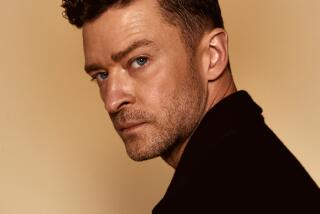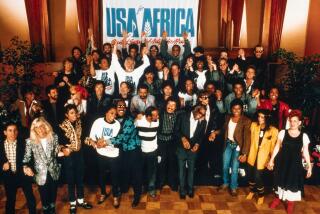POP MUSIC REVIEW : Prince Strikes Out in Flashy, but Tentative Concert Return
- Share via
Prince is no Kirk Gibson.
At least, he’s not delivering a home run on his current “Lovesexy” tour, which opened a two-night stand Sunday at the Sports Arena.
At a time when Prince’s artistic vision could stand considerable redefining, the 30-year-old Minneapolis marvel seemed powerless to project an exciting or purposeful new direction during the 2 1/2-hour concert.
The failure was glaring because Prince--in a remarkably bold and sophisticated game plan--spent most of the opening half of his flashy, highly theatrical revue striking out at many of the (by now) cliched trimmings of his post-”Purple Rain” superstar persona.
Indeed, Prince ended the opening half of the concert by having the hedonistic and self-absorbed “superstar monster” gunned down in a police shoot-out.
Going off stage at intermission, he promised a reborn-Prince in the second half. But Prince didn’t deliver. He treated the songs with more care in the second half, especially the spiritually tinged numbers from his last two albums.
But the intimacy and heart of the second half’s opening moments soon gave way to a somewhat predictable replay of hits, from “Kiss” and “1999” to “Purple Rain.”
Even when Prince got a second chance at a 2 a.m. concert afterwards at the Palace in Hollywood, he seemed oddly tentative. (See review on page 4.)
If Gibson had done no better in his crucial at-bats last month, the World Championship flags would be flying in New York or Oakland.
No question: Prince is the among most audacious and incautious figures in pop history--someone blessed with almost unlimited talent, yet it often seems he is cursed with equally unbridled and unfocused ambition.
No one in pop in the ‘80s has written and/or produced as many classic pop tracks--from the sensual sparks of “U Got the Look” to the poignant commentary of “Sign ‘O’ the Times.”
Early in his career, Prince was a master provocateur whose bold, liberating stance challenged an audience’s social and sexual assumptions. But he began adopting a more conservative approach following the enormous success of his “Purple Rain” album and film in 1984. Instead of challenging audiences, he often seemed to be catering to them.
In his first formal concert tour in three years, Prince spent the opening half of the show Sunday showcasing many of the uninvolving aspects of the conservative, cliched persona.
Even the stage itself seemed a commentary on the excesses of the rock superstar world. He and his eight-piece band, including drummer Sheila E., performed on a mammoth, split-level affair set up theater-in-the-round style in the center of the Sports Arena floor.
Prince made his entrance riding in a white 1967 Thunderbird. As soon as he stepped from the car, he began dancing and singing his way through a long medley of song bits and pieces that seemed to race by like a video recorder on fast-forward.
Along the way he went through some of his all-too-familiar bedroom moves, pawing (and at one point cavorting on a bed) with scantily clad dancer Cat Glover. While the band played with precision, there was little sense of involvement on Prince’s part.
It seemed at times like a soul-less Broadway revue based on his music: a sort of premature “Princemania,” with Prince somehow suckered into playing the lead role.
The message of this opening hour was that the persona had become more important than the music--an always fatal mistake for a musician. If it all seemed disheartening to longtime Prince admirers, that apparently was precisely Prince’s intent.
“End of Part I,” he said in somber tones, after the dramatic “shoot-out” with police that “killed” the ghost of Prince’s past. He then went into a most heartfelt version of “Anna Stesia,” a statement of spiritual desire from the excellent “Lovesexy” album.
Part II opened on a promising note with delicate and endearing versions of newer tunes, including “The Cross” and “I Wish U Heaven.” The music, once again, had become more important than the persona.
But Prince seemed uncertain about just how far to push this spiritual bent. Just when he was displaying passion, he blinked. Despite having plenty of fresh and generally excellent new material to draw from, he began falling back on some of the old moves and was soon into a rather careless replay of hits.
But they were mostly infield flies. If Prince is going to be as important a pop figure in the ‘90s as he has been in the ‘80s, he needs to start swinging for the fence again.
More to Read
The biggest entertainment stories
Get our big stories about Hollywood, film, television, music, arts, culture and more right in your inbox as soon as they publish.
You may occasionally receive promotional content from the Los Angeles Times.










